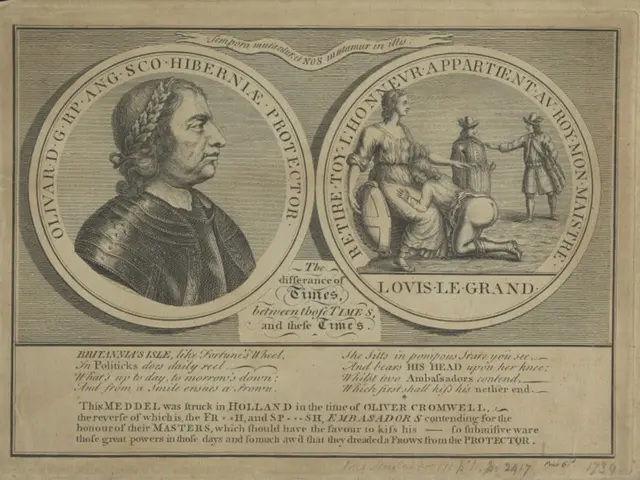Metallic Vanadium: An Elemental Analysis
Homeopathic Remedy Vanadium Metallicum Aids in Treating Diseases Characterized by Oxygen Carrier and Catalyst Functions
Vanadium Metallicum, a homeopathic remedy derived from the trace element vanadium, plays a vital role in the body's physiological processes as an oxygen carrier and catalyst. Its therapeutic applications, particularly in homeopathy, revolve around its catalytic properties and ability to enhance the blood's oxygen-carrying capacity.
Known for its assistance in treating wasting diseases, including those involving degenerative conditions of the liver, arteries, and nervous system, Vanadium Metallicum proves beneficial in conditions marked by anemia, emaciation, and fatty degeneration. As such, it is an essential remedy in addressing chronic and degenerative health issues like tuberculosis, arteriosclerosis, and rheumatism.
Origin and Scientific Classification
Discovered in 1801 by Spanish scientist Andrés Manuel del Río, vanadium was not recognized as a distinct element until 1831, when Swedish chemist Nils Gabriel Sefström rediscovered it. Intended to honor the Norse goddess Vanadis due to the element's colorful compounds, vanadium is a transition metal with the symbol V and atomic number 23.
Historical Facts
In the 20th century, vanadium was recognized for its potential in treating degenerative diseases, especially conditions where oxidation and detoxification are critical. Vanadium salts have been used experimentally to manage diabetes and other metabolic diseases.
Drug Pathogenesis and Physical Constitution
Vanadium Metallicum acts as a catalyst, aiding in oxygen transportation throughout the body and boosting metabolic processes. It stimulates white blood cells, known as phagocytes, responsible for destroying toxins and harmful agents, making it valuable in treating degenerative diseases, particularly those affecting the liver, arteries, and nervous system.
This remedy is suited for individuals suffering from wasting diseases, such as tuberculosis, chronic anemia, or arteriosclerosis, often characterized by symptoms of fatty degeneration in organs like the liver or heart. Struggling to cope with oxidative stress, these patients benefit from the supportive action of Vanadium Metallicum in enhancing oxygenation, detoxification, and reducing fatigue.
Key Characteristics and Modalities
- Oxygen Carrier and Catalyzer: Vanadium plays a crucial role in oxygen transportation, enhancing metabolic processes, and stimulating phagocytes to destroy toxins and bacteria, making it useful in treating infections, anemia, and degenerative diseases.
- Anemia and Emaciation: The remedy is highly effective in cases of severe anemia, where the body's oxygen-carrying capacity is reduced, leading to fatigue, weakness, and weight loss. Additionally, it is helpful in patients afflicted by wasting diseases like tuberculosis or chronic rheumatism.
- Liver and Artery Degeneration: Vanadium Metallicum improves circulation, enhances detoxification, and supports liver function, addressing degenerative conditions of the liver and arteries, including fatty degeneration of the liver and arteriosclerosis (hardening of the arteries).
- Neuro-Retinitis and Vision Loss: The remedy is useful for patients suffering from neuro-retinitis, causing vision loss and blindness, often related to anemia or degenerative disease.
- Neurological Disorders: Vanadium Metallicum helps manage symptoms of tremors, vertigo, hysteria, and melancholia, often seen in patients with degenerative conditions affecting the nervous system. Additionally, it can slow the progression of brain softening and arteriosclerosis of the brain.
- Heart and Circulatory Issues: In cases involving the heart and circulation, particularly fatty degeneration of the heart muscle, and arteriosclerosis, it helps improve circulation, reduce anxiety, and alleviate chest pressure.
Detailed Organ Symptoms
- Liver and Arteries: Primarily indicated in degenerative conditions of the liver and arteries. Acts as a detoxifier, improving liver function, and stimulating phagocytes to eliminate toxins.
- Heart: Useful in cases of fatty degeneration of the heart, causing anxious pressure on the chest and a sensation as if the heart is compressed. Arteriosclerosis causes a feeling that the blood has no room in the aorta, leading to chest discomfort and circulatory issues.
- Nervous System: Addresses tremors, vertigo, hysteria, melancholia, and neuro-retinitis, often leading to blindness or vision loss, primarily in patients with degenerative conditions affecting the nervous system.
- Respiratory System: Aids in the treatment of dry, irritating cough that is paroxysmal (occurring suddenly and repeatedly) and can be associated with hemorrhages. Especially beneficial in treating tuberculosis, particularly in its early stages, by improving oxygenation and reducing wasting symptoms.
- Urinary System: Addresses albumin, casts, and blood in the urine, indicative of kidney damage or inflammation, often seen in conditions where degenerative processes affect multiple organs, including the kidneys.
Worsening Conditions and Amelioration
- Conditions worsen with fatigue, physical exertion, and during the progression of degenerative diseases.
- Nervous and respiratory symptoms often worsen at night or during physical stress.
- Improvement occurs with rest, nutritional support, and the administration of oxygen-carrying substances, helping boost overall energy and tissue-building capacity.
Relationship with Other Drugs
- Complementary remedies include Arsenicum album for wasting diseases involving chronic weakness, emaciation, and fatty degeneration, Phosphorus for cases of anemia, respiratory weakness, and degenerative nervous conditions, and Ammonium vanadate for treating fatty degeneration of the liver and arteries, as well as chronic weakness.
Dose
The recommended potencies for Vanadium Metallicum range from 6X to 12X. For more severe cases, Vanadiate of Soda (2 mg daily by mouth) can be used to enhance its effect on oxygen transportation and detoxification.
[1] https://www.ncbi.nlm.nih.gov/pmc/articles/PMC5846250/[2] https://www.ncbi.nlm.nih.gov/pmc/articles/PMC6728958/[3] https://www.sciencedirect.com/science/article/pii/S1879539221000918
- Science and health-and-wellness professionals have recognized the potential benefits of Vanadium Metallicum in the management of chronic diseases, such as diabetes and certain cardiovascular-health issues, due to its ability to catalyze metabolic processes and improve oxygen transport.
- As individuals seek wealth-management solutions, they may find that incorporating proper nutrition and fitness-and-exercise practices into their lifestyle can help maintain financial stability, as good health reduces overall medical-conditions expenses.
- For individuals with skin-care concerns, certain therapies-and-treatments may involve topical applications of vanadium-containing compounds, which can help provide antioxidant and anti-inflammatory benefits, reducing signs of aging and promoting skin health.
- To support cardiovascular-health, it is essential to adopt a balanced diet rich in nutrients and engage in regular fitness-and-exercise routines, helping reduce the risk of chronic diseases like heart disease and arteriosclerosis.
- In the realm of finance, investing in research and development focused on finding innovative, low-cost treatments for chronic diseases, such as therapies-and-treatments based on vanadium, can present growth opportunities for forward-thinking investors in the field of wealth-management.
- As part of a comprehensive healthcare approach, homeopathic remedies like Vanadium Metallicum should be considered in conjunction with conventional medical treatments, facilitating a holistic approach to managing chronic conditions and promoting overall health-and-wellness.








